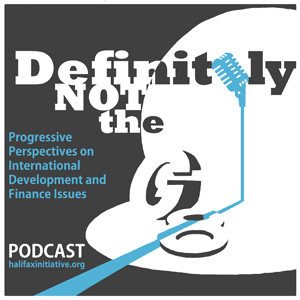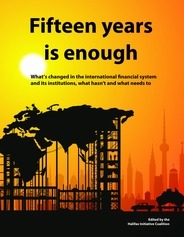The Millennium Development Goals
 |
Final script May 22, 2010; release date June 18, 2010. |
 |
Final script May 22, 2010; release date June 18, 2010. |
Bridge to South KoreaHeld in Toronto, on Monday and Tuesday, June 21-22, 2010, just ahead of the G8 Summit in Huntsville and the G20 Summit in Toronto, this meeting was intended as a strategy session for civil society organizations, platforms and networks from many G20 countries (and beyond) to discuss diverse perspectives on both the G20 as an institution and priorities with respect to its agenda. As the outcome of an initial G20 strategy meeting in Washington DC in April of 2010 among various groups, the intention of this broader meeting of national, regional and international networks was three-fold:
|
MEETING DETAILS
|
Bridge to South KoreaHeld in Toronto, on Monday and Tuesday, June 21-22, 2010, just ahead of the G8 Summit in Huntsville and the G20 Summit in Toronto, this meeting was intended as a strategy session for civil society organizations, platforms and networks from many G20 countries (and beyond) to discuss diverse perspectives on both the G20 as an institution and priorities with respect to its agenda. As the outcome of an initial G20 strategy meeting in Washington DC in April of 2010 among various groups, the intention of this broader meeting of national, regional and international networks was three-fold:
|
MEETING DETAILS
|
 What’s changed in the international financial system and its institutions, what hasn’t and what needs to
What’s changed in the international financial system and its institutions, what hasn’t and what needs toExecutive Summary
Back in 1995, the G7 met in Halifax during a “time of change and opportunity.” The meeting took place in a context of mounting deficits and debt crises in countries in the South; in the wake of economic collapse in Mexico; and amid strong global criticism from civil society, the media and governments about the World Bank and International Monetary Fund’s (IMF) austere neo-liberal structural adjustment policies.
A lot has changed since then, partly in response to the Halifax G7 Summit and subsequent G7 and G8 meetings. Too many of these improvements, however, exist only on paper. Beyond the surface, the neo-liberal, market-oriented bias that guides the Bank and Fund’s agenda and thinking has not altered.
The 2010 G8 Summit in Toronto in 2010 takes place during another “time of change and opportunity.” The financial crisis has spurred many civil society organizations (CSOs) to insist on far-reaching changes to the global financial system and its institutions. Clearly, as this publication will illustrate, 15 years of refusing to deal with the manifest shortcomings of the global economic system is enough.
Parliamentary Roundtables on the G8/G20 Agendas 2010 is an important and unique moment for Parliamentarians to engage with Canadians on some of the most important global issues facing our planet and our future. On June 25th, 2010, To date, there has been little discussion among parliamentarians about the themes leading up to the 2010 summits, and Canadian civil society is looking to engage members from all parties in a discussion around some of the issues highlighted in our civil society platform, An Agenda for Global Development: G8/G20 Civil Society Coalition Platform, endorsed by over 60 organizations across the country. The platform discusses specific, measurable, realistic recommendations to put poverty eradication, economic recovery for all and environmental justice at the centre of the international agenda. To facilitate the conversation, Canadian civil society is organizing three parliamentary roundtables to discuss party perspectives on climate change, the financial crisis and the millennium development goals (MDGs). The Roundtables will occur as the G20 Finance Ministers meet in Washington, as G8 Development Ministers meet in Halifax and as Canada hosts the Africa Partnership Forum in Toronto. Roundtable 1: Climate change Roundtable 2: Global financial crisis Roundtable 3: Millennium Development Goals |
ROUNDTABLE DETAILS Canadian G8 G20 Civil Society Platform Roundtable Agendas Moderator, MP and Expert Bios Podcasts
|
Rethinking the international financial system during a time of crisis
Introduction
On October 19 and 20, 2009, the Halifax Initiative held a conference, co-hosted by The North South Institute, the University of Ottawa and the School of International Development and Global Studies (SIDGS), entitled "What’s Missing in the Response to the Global Financial Crisis?" The meeting brought together experts from a range of backgrounds to analyze the challenges facing the global economy, discuss the ways in which the international community has responded to the current financial crisis, and identify shortcomings in these responses.
 In June 2010, the Halifax Initiative launched the first in a series of radio documentary -type podcasts under the rubric of "Definitely NOT the G8" just ahead of the 2010 Group of Eight (G8) and Twenty (G20) meetings in Huntsville and Toronto, Canada on June 25-27 2010.
In June 2010, the Halifax Initiative launched the first in a series of radio documentary -type podcasts under the rubric of "Definitely NOT the G8" just ahead of the 2010 Group of Eight (G8) and Twenty (G20) meetings in Huntsville and Toronto, Canada on June 25-27 2010.
The podcasts have three goals:
Presentation regarding the principles for guiding a more democratic, representative and accountable G-20
by Fraser Reilly-King, Coordinator, Halifax Initiative Coalition
October 29, 2009
Thank you for inviting us to appear before the Standing Committee to discuss issues related to next year’s Group of Eight and Group of Twenty meeting in Huntsville, Ontario in June.
| Topic | Presentation | Speech |
| KEY NOTE: Thinking the unthinkable – The global financial crisis as an opportunity for transformative and systemic change? | Podcast | |
| Causes of, and responses to, the global financial crisis - Chuck Freedman, Co-Director, Centre for Monetary and Financial Economics, Carleton University |
http://www.ipsnews.net/news.asp?idnews=44504
FINANCE: NGOs Call for Radical Reforms as IMF Offers New Loans
By Jim Lobe